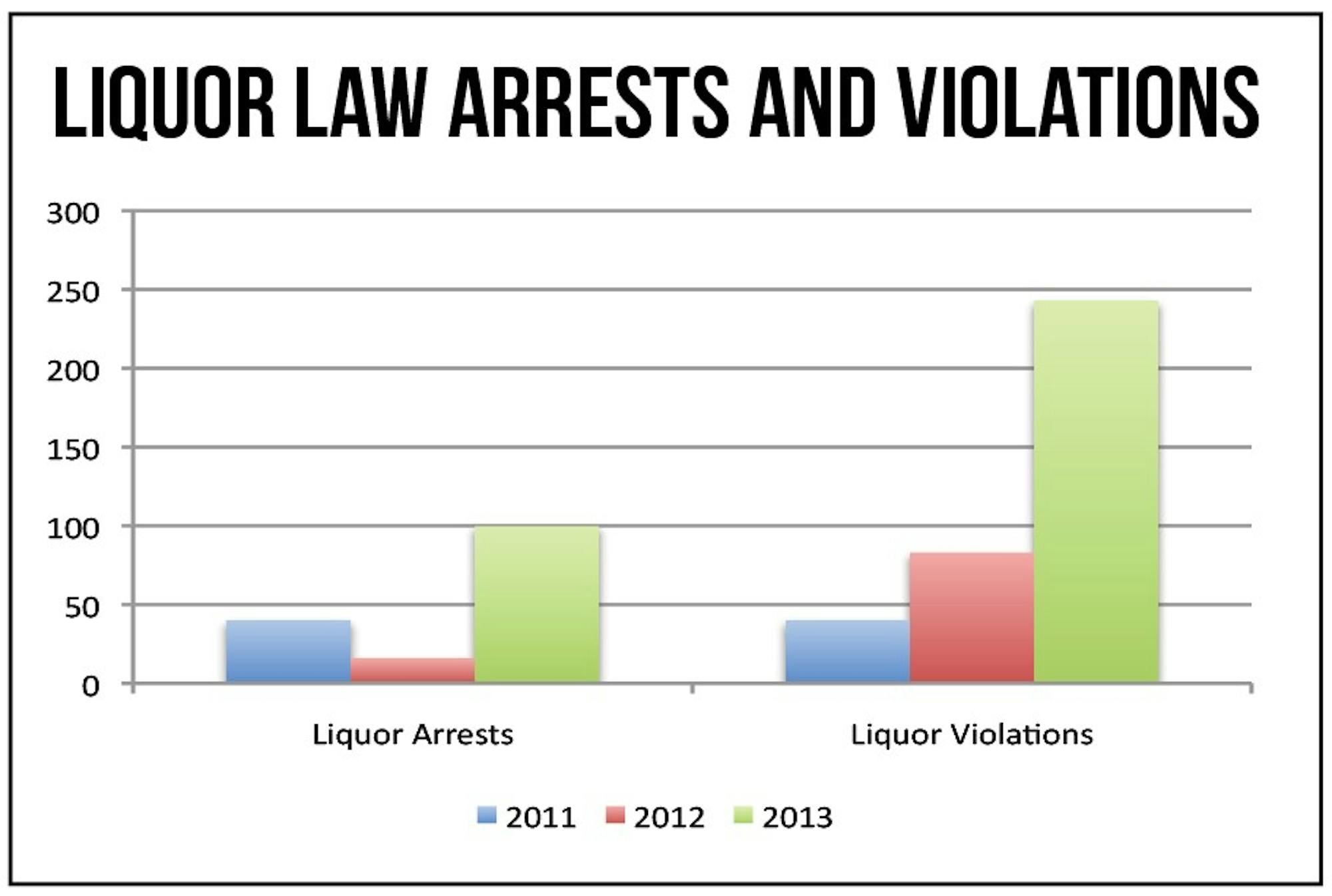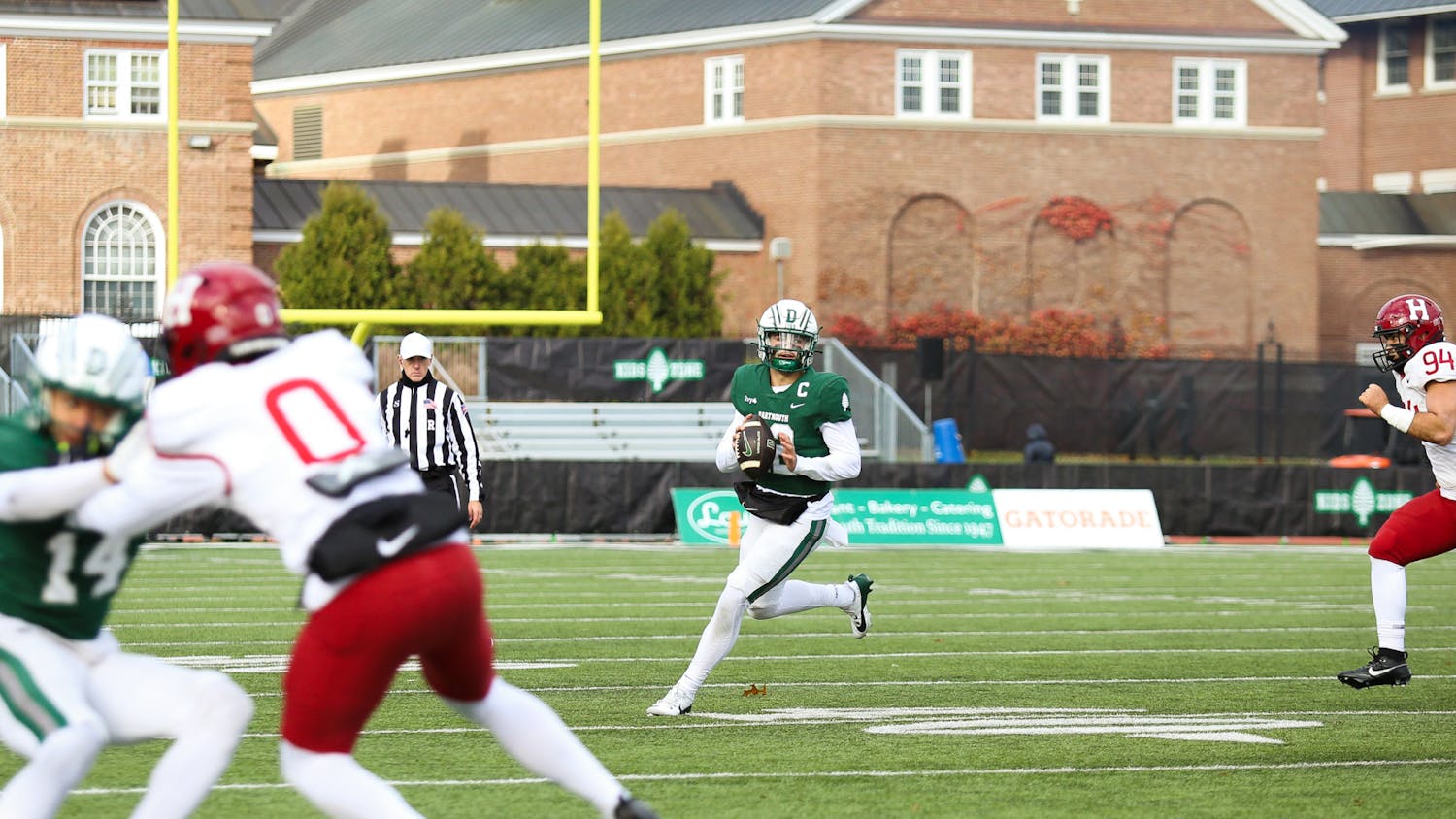Sexual assault and burglary reports jumped in 2013, and following a change in how the College tallies liquor law arrests and violations, reports of these incidents skyrocketed. The College released its annual security and fire safety report as mandated by the Clery Act on Wednesday afternoon.
Reported forcible sex offenses increased to 35 in 2013 from 24 in 2012, while burglary reports increased to 27 from 16. Drug law arrests increased to 22 in 2013, from 16 in 2012, while drug law violations referred for disciplinary action remained steady at 20.
Liquor law arrests soared to 100 in 2013, from 16 in 2012. Safety and Security director Harry Kinne said the jump follows a new recording policy which now includes students referred to the Hanover Alcohol Diversion Program, which offers first-time underage drinking offenders an educational alternative to court. Liquor law violations referred for disciplinary action jumped to 243 from 83, as the data now comprise not only students who undergo Committee on Standards disciplinary procedures but also those referred to the Brief Alcohol Screening and Intervention for College Students program — a drinking behavior assessment program implemented in 2011 which consists of a 20-minute online survey about alcohol and drug use followed by a one-on-one interview.
Kinne said the boost in numbers does not reflect a change in students’ behavior, but a change in way the data is tallied, based on recommendations from a consulting firm specializing in campus safety, security and regulatory compliance.
The firm, which was hired to review Dartmouth’s data collection, told College officials that changing the counting policy would bring them “more in compliance with the law,” Kinne said.
College spokesperson Justin Anderson said the report now includes every incident that could possibly be counted as a liquor law arrest or referral for disciplinary action.
In the past, students who were referred to Dick’s House as a result of the Good Samaritan policy were not included in the tally. The consultants clarified that Good Samaritan reports meet the standard of “referrals for disciplinary action” because if a student refuses to go to BASICS he or she would undergo normal disciplinary procedures through the Committee on Standards.
A new standard also applies to liquor law arrests, Kinne said. When a student is found violating New Hampshire alcohol laws by the police, an officer can either arrest the student or refer him or her to the Hanover Diversion program, Kinne said. While in previous years students referred to the Diversion program were not included in the data, the consultants said those incidents should be tallied as arrests.
For the third year in a row, Dartmouth reported a rise in the number of forcible sexual offenses, including rape and sexual assault, on campus. The College reported 24 offenses in 2012 and 15 in 2011.
Drawing conclusions from the jump in sexual assault numbers is difficult because the crime is historically underreported, Kinne said, adding that the College has increased the “avenues and touch points” for reporting this year.
“We think we’ve been somewhat successful in that, so we’re anticipating our reports will go up,” he said.
The College added stalking, domestic violence and dating violence statistics as separate categories in this year’s report, following the 2013 Violence Against Women Reauthorization Act. Although the legislation does not require this data in the reports until 2015, there has been a “good faith effort” by schools across the country, including Dartmouth, to add the data earlier, Kinne said.
For 2013, the report includes one dating violence incident, four stalking incidents and no reports of domestic violence.
Some data included in the annual report covers individuals unaffiliated with the College, such as visitors to campus, Title IX coordinator Heather Lindkvist said.
All reported crimes are included in the report, regardless of a “guilty” verdict or formal legal process, Anderson said.
The Department of Education opened an investigation of alleged Clery Act violations at Dartmouth on Aug. 18. Noncompliance with Clery Act requirements or failing to take corrective action can lead to federal sanctions ranging in severity from fines to termination of federal financial aid programs.
The Clery Act mandates that institutions release their security reports, which also include information on campus policies and practices, by Oct. 1.
Methodology and recording procedures vary from school to school.
Looking at incidents reported on campus, non-campus and public property, Dartmouth saw a total of 73 criminal offenses — including homicide, negligent manslaughter, forcible sex offences, robbery, aggravated assault, burglary, motor vehicle theft, arson, domestic violence, dating violence and stalking. Among the Ivy League, Brown University reported a total of 104 criminal offenses; Cornell University, 28; Columbia University, 79; Harvard University, 145; Princeton University, 57; the University of Pennsylvania, 92 and Yale University, 135 .
The Violence Against Women Reauthorization Act also changed the method of reporting sex offenses from the previous division of forcible and non-forcible to match the FBI definition of rape, incest, fondling and statutory rape. Reports from four institutions followed the new division of sex offenses. Columbia reported 14 rapes; Harvard, 18; Princeton, six and Penn, nine.
Some universities instead continued reporting the number of forcible and non-forcible sex offenses. On campus, Brown reported 21 forcible sex offenses, Cornell saw two and Yale reported 12.
On campus, Yale saw the most incidents of stalking, at 17, and domestic violence, at 7. Columbia saw the most dating violence, with 12 reported cases.
This article, which has been updated since it was initially published Wednesday afternoon, ran in Thursday's print edition with the headline "College releases safety report."




